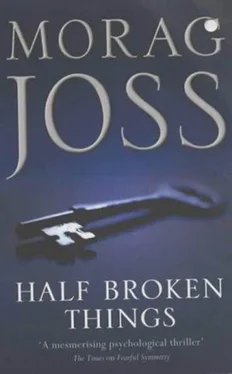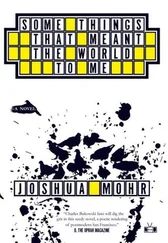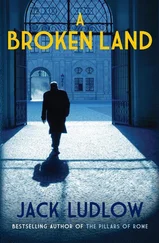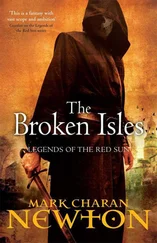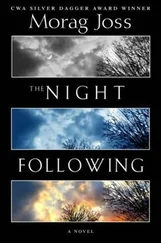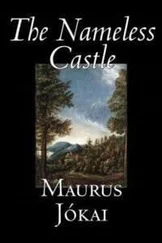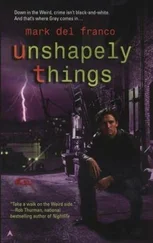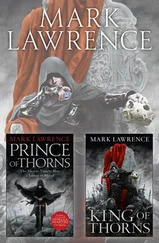Morag Joss - Half Broken Things
Здесь есть возможность читать онлайн «Morag Joss - Half Broken Things» весь текст электронной книги совершенно бесплатно (целиком полную версию без сокращений). В некоторых случаях можно слушать аудио, скачать через торрент в формате fb2 и присутствует краткое содержание. Жанр: Детектив, на английском языке. Описание произведения, (предисловие) а так же отзывы посетителей доступны на портале библиотеки ЛибКат.
- Название:Half Broken Things
- Автор:
- Жанр:
- Год:неизвестен
- ISBN:нет данных
- Рейтинг книги:3 / 5. Голосов: 1
-
Избранное:Добавить в избранное
- Отзывы:
-
Ваша оценка:
- 60
- 1
- 2
- 3
- 4
- 5
Half Broken Things: краткое содержание, описание и аннотация
Предлагаем к чтению аннотацию, описание, краткое содержание или предисловие (зависит от того, что написал сам автор книги «Half Broken Things»). Если вы не нашли необходимую информацию о книге — напишите в комментариях, мы постараемся отыскать её.
Loners Jean, Micheal and Steph are drawn together to Walden Manor by a mixture of deceit, good luck and misfortune. There, they shape new lives, full of hope and happiness. When their idyll is threatened they discover their new lives are worth preserving. But at what cost?
Half Broken Things — читать онлайн бесплатно полную книгу (весь текст) целиком
Ниже представлен текст книги, разбитый по страницам. Система сохранения места последней прочитанной страницы, позволяет с удобством читать онлайн бесплатно книгу «Half Broken Things», без необходимости каждый раз заново искать на чём Вы остановились. Поставьте закладку, и сможете в любой момент перейти на страницу, на которой закончили чтение.
Интервал:
Закладка:
I suppose I’m of that generation that is meant to believe that everything is worse than it used to be, including mothers. But they could be bad in my day, too. I’ve been painfully aware from an early age of how bad mothers can be. So it’s just in general that I think I don’t understand mothers (with the exception of Steph, of course) and not, as you might expect me to say, ‘modern’ mothers. Nor am I saying that Sally is necessarily a bad mother. She committed no sin; inattention is not in itself a sin, though I am of the no doubt old-fashioned opinion that there is considerable vanity in the belief that one can attend satisfactorily to so many things at once. But no, the puzzle is mothers generally. There’s no explaining them or, to be more accurate, there’s no explaining why the people who make the best ones are not necessarily the ones who have the babies.
Although I’m not referring to Mother, is that clear? I daresay Mother and I each blamed the other for our situation, and I am prepared to admit that I cannot have been without fault. No, I mean my own, actual mother, the one who (I like to think still) was killed in an air raid on Cardiff just before my fifth birthday, in 1940. The one who I am sure must have made the dress I was wearing on the day when Mother collected me from the children’s home and brought me on the train all the way back to Oakfield Avenue. The one of whom I do not have a photograph and cannot recall a thing, not the colour of her hair, the sound of her voice, nor the smell of her skin, nor the feel of my arms round her neck. It may even be a presumption that I ever did put my arms round her neck, but I cannot imagine I did not. Not knowing how that felt is what I most miss- and this is important, the point being that it is perfectly possible to miss something one has never had. It is not the contrast between having and not-having that is at the root of the pain. You simply go without and feel the lack.
In fact I don’t know why I think about necks and arms when what I recall most about that time is knees. Not even hers, my real mother’s, but Mother’s. That day we had walked from the children’s home to the station without saying anything. Mother carried my case in one hand and held on to the strap of her shoulder bag in the other. Was that why she did not take my hand? While we were in the waiting room I needed to go to the lavatory, so I raised my hand and asked to be excused. Mother pushed my arm down and said very quickly, ‘You should have gone before we left. What a waste of a good penny. And you’re to call me Mother.’
Then in the train there were Mother’s purple and white knees (like two not very meaty ham hocks, as I now picture them). It was freezing, and so crowded that there was nowhere for me to sit, so I stood next to her the entire way. My ankles were stinging with tiredness, and I kept lurching over onto the sides of my shoes until she told me I would ruin them. Sometimes I tried to lean against her knees just to take the weight off my legs, but they were too hard and wide, as clenched as fists, and she would move me off and tell me not to fidget. She did not take me onto her lap because she was knitting most of the way, something that had no colour. There was a bit of conversation in the carriage, I think about me, there was an atmosphere of slight congratulation; Mother behaved as if she had acquired something quite covetable that was nevertheless proving awkward to cart home, like a new ironing board or a stepladder or something. A lady told me she was sure I had a nice smile, would I not show her how nice my smile was? I think Mother was pleased at that, but she never stopped knitting. I remember watching the needles going up and down and from side to side, and I could tell she was doing it to fend me off.
Anyway, all that is beside the point. I don’t know why I digressed, unless it’s to show that I have never, at least not since the age of five, been starry-eyed about mothers. Yet I was taken aback that Sally handed Charlie over so casually. Glad, too, of course, because Charlie made us complete, but at the same time almost annoyed. It was no doubt perverse of me but I kept thinking, how could she? I would never, ever have let Michael be taken off by virtual strangers at that age. I told him so and I think he liked knowing that if he had been in my care he would not have been dumped with just anybody for any reason at all, let alone for a hot air balloon festival. What is that, anyway? Sally had her priorities all wrong. In fact it’s hard to believe she even thought of herself as a mother in the true sense. There’s some excuse, you see, for Mother (I see that now), who never actually gave birth to me, but none for my actual mother or, in my opinion, for Sally. Though I am not without sympathy for her. I do realise that she will be terribly upset.
Steph wheeled Charlie back to Sally’s house on Sunday evening trying not to mind that Sally’s holiday with Philip was over. Four days and nights with Charlie had been just long enough to get used to having him with her all the time, and he fitted so perfectly into whatever else they did, observing what they were up to with such amused interest, that sometimes it even seemed that they went about jobs just so that he could watch. The planting of her marigolds, for instance. They had been almost as much for Charlie as for Miranda.
The stock of Bill’s shop in the village had been expanding as the summer progressed; he had set out slanting tables outside from which he sold local fruit, vegetables and plants, spending long hours, when it was warm enough, sitting out there himself on a picnic chair with his newspaper. On Wednesday morning, walking Charlie back to the manor for his four day stay, Steph’s eye had been caught by trays of bright yellow marigolds. On an impulse she had bought three of them, earning Bill’s undying respect, and had taken nearly twice as long as usual to walk back to the manor with two of them wedged into the carrying shelf at the base of the pushchair and the third balanced on the front bar. While Charlie watched, she planted them out later that day in the shape of a wide letter M, over Miranda’s grave under Jean’s magnolia tree. Of course she got a little tearful, and Charlie watched her solemnly and almost seemed to understand.
But it was Sunday now; the marigolds had been watered in and were doing well, and it seemed a long time since Wednesday. Still, she would have Charlie back again in the morning, she told herself. But all the way down the drive and along the main road to the village she was thinking how crazy it was, all this ferrying back and forward to Sally’s just to leave Charlie there for a few hours overnight. Sally would be going back to work the next day, and Steph knew that on Monday night the old pattern would resume; Sally would barge in loudly, and she would have to be waiting to hand Charlie over to her again. It was becoming harder and harder to do. Even as she would be calling out ‘Hi! In here!’ in response to Sally’s crash of the front door, she would be silently begging Charlie to understand that she was not betraying him. She would nuzzle one more time into his neck and breathe in his ear that she would be back in the morning, but she could not bear to look at him closely for fear that she might see abandonment on his face. Giving him back at the end of each day felt pointless and inappropriate, especially as Sally more often than not did not stop yapping long enough to take much notice of him. When she did quieten down long enough to acknowledge that he was actually sitting on her lap, she seemed reluctant to break some train of thought of her own in order to pay him any proper attention. Steph sometimes wondered if she ought to remind her that she had spent the past nine hours away from her baby son and should be more delighted to have him back.
Читать дальшеИнтервал:
Закладка:
Похожие книги на «Half Broken Things»
Представляем Вашему вниманию похожие книги на «Half Broken Things» списком для выбора. Мы отобрали схожую по названию и смыслу литературу в надежде предоставить читателям больше вариантов отыскать новые, интересные, ещё непрочитанные произведения.
Обсуждение, отзывы о книге «Half Broken Things» и просто собственные мнения читателей. Оставьте ваши комментарии, напишите, что Вы думаете о произведении, его смысле или главных героях. Укажите что конкретно понравилось, а что нет, и почему Вы так считаете.
